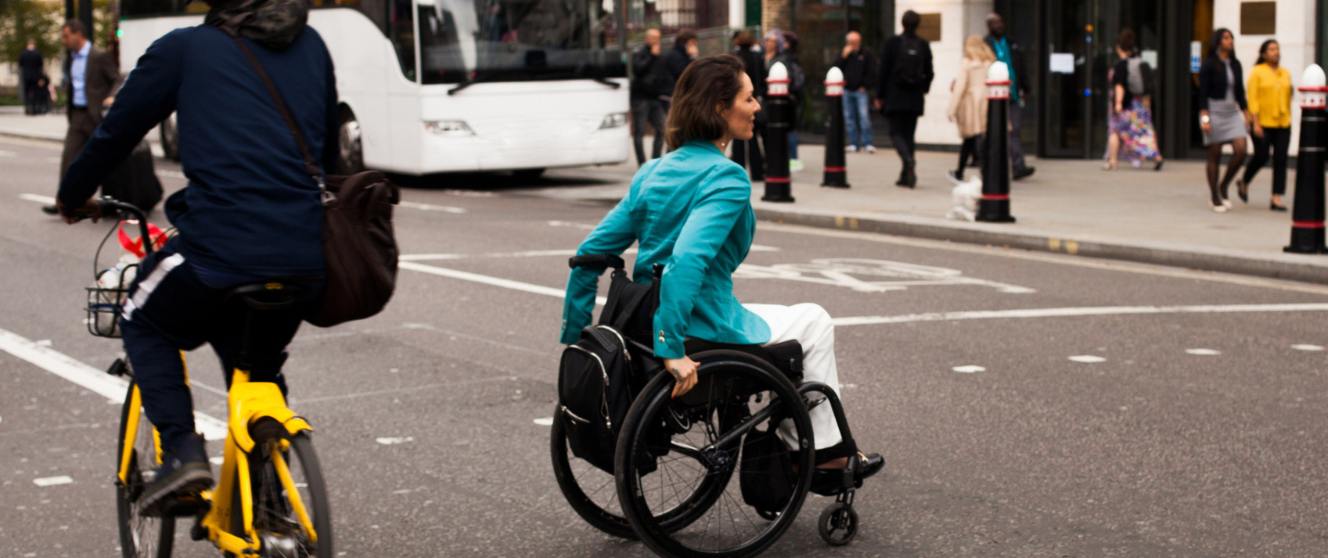
Reprinted from The Independent, Summer 1977
Ed Roberts: Congressional Hearings in the Federal Building
Friday, April 15, 1977, conducted by Congresspersons Phil Burton and George Miller
I had prepared testimony which I will give you, but I think I’d like to wing it.
First of all, I would like to begin by saying to the two of you who came and saw and helped us over these years in major battles, thank you. Now we’re down to the bottom line. The basic issue here is are we going to perpetuate segregation in our society. We are one of the largest minorities in this country. I looked at the 18 points H.E.W. put out this morning. I have never seen a better blue print for segregation. These kinds of issues, the issue of Civil Rights and Human Rights are not issues that people with disabilities can compromise with any further.
My ability to move around and my ability to regain a pride in myself as a person with a disability is one of the most important things that has happened here today. To see hundreds of people with disabilities roll, sign, using canes, the more severely retarded people for the first time joining us in an incredible struggle, is one that leads me to believe that we’re going to win this. Because we are not going to stop until 504 is a reality. 504, I believe, is a basic Civil Rights platform, a platform that guarantees to each person with a disability in this country that they are equal in the eyes of the law and that they will have equal access to educational institutions, hospitals, to the institutions in our society which serve us all.
This Hearing is symbolic and we want you involved. And we are going to make a change then, and by making these changes we’re going to begin to acknowledge in this society that people with disabilities are people first and we are not going to concentrate on the fact that they happen to be different. In fact, I am proud enough now to believe that people in our society are missing a tremendous feeling by not knowing me, by not knowing Judy Heumann, by not knowing the people here and the millions of other people with disabilities in our society. I think this country would be a much freer and fuller place if equal access and equal rights were guaranteed.
Eugene Eidenberg: Spokesperson for H.E.W. Secretary Califano
The disabled group here and all over the country have no fundamental disagreement with Mr. Califano. He has tried to be as direct as he could on what decisions he was making.
George Miller:
Why couldn’t the structural changes be made and the curriculum followed. Why delay another year. There are certain provisions that the longer you hold them, the longer you build in the discrimination.
Eidenberg:
(responding to Miller’s question about why schools are being exempted for yet another year) The question of Consortia. I know that’s a very controversial approach to providing some services. I don’t utter it cavalierly, not understanding the implications. Those kinds of questions are there. The issue is whether we can provide more services rapidly, say in a first phase when you look at it in a longer term strategy of getting facilities up to speed by using combined public facilities in education or in medical areas. That is, from one perspective, unequal treatment, it a separate-but-equal approach; but on the other hand, if we can provide access through regulations, through a consortia approach in the early stages with some known time frame, subsequently to bring all facilities under compliance, that kind of alternative deserves review and that’s the kind of question that’s under review and, again, no decision has been made. I want to give you some sense of what the issues are that are requiring the review and analysis that is underway. It would be a mistake to suggest that all the changes by definition are a water down or a weakening of the commitment of 504.
Judy Heumann:
It’s very difficult for us to sit here allowing discussions to go on which, in our opinion, really violate the intent of the law. Whether here was a Section 504, whether there was a Public Law 94-142, whether there was a Brown vs. Board of Education, the harassment, the lack of equities that has been provided for disabled individuals, that now is even being discussed by the administration, is so intolerable that I cannot put into words. I can tell you that every time you raise issues of separate-but-equal the outrage of disabled individuals across the country is going to continue, is going to be ignited. There will be more takeovers of buildings until finally, maybe, you’ll begin to understand our position. We will no longer allow the government to oppress disabled individuals. We want the law enforced. We want no more segregation. We will accept no more discussions of segregation and I would appreciate it if you would stop shaking your head in agreement when I do not think you know what we are talking about.
Eidenberg:
I wasn’t nodding my head in agreement but in disagreement. I think there has been a very fundamental misunderstanding of something I said.
(regarding the demonstration) I prefer to characterize this as an inconvenience rather than a disruption.
Joan Tollifson: Demonstrator
I was really afraid growing up that physically I was inadequate, physically I was ugly. I became very angry about what was coming down on me and I had no outlet for that anger. I had totally internalized the oppression that comes down on you. And also, I was programmed not to associate with other disabled people. I felt that if I associated with other disabled people that that would devalue me in the eyes of normals and the object was to pass as normal, and so I stayed away and if I saw another disabled person I made no attempt to become friendly with them. In fact, I made an effort to avoid them, make no contact.
Jonathan Willis, Demonstrator
I have CP from birth and the main reason I am here is that the disabled have been handled so badly, too many times, by agencies. We’ve never gotten anything, basically, in this country. Look at any minority. To get something they have had to take to the streets. I think that the only way you get anything is to demonstrate.
Cece Weeks, Demonstrator
There have not been any bad things here at the demonstration. It has made me feel united with more people. I feel like a national coalition will come out of this? it will make changes in our lives. We will have more options now because 504 will give us power to implement our rights. Now people walk by this building and actually see you still here and give you the power signal, thumbs up. I am now hopeful mothers won’t snatch their children away and say “Don’t look.” It’s sensible to everybody except Califano and Carter. People are with us now because we have been so sensible.
Jeannine Whitmer, Demonstrator
I know the issues around 504. I know how it will affect educational facilities. I went to school at Wayne State because it was accessible, and it was assumed I would go there. It had nothing I wanted- it was the only option open. Michigan State and U. of Michigan were and are inaccessible. Now I go to SF State and it is relatively accessible. It’s taken four years, chopping down their barriers. The building which has the liberal studies in it is inaccessible. Basic Science building is inaccessible. That means the disabled cannot go into the technical science fields there. If I were just starting in my education now I would go into medicine. As an undergraduate they said to me, “You want to be a doctor?” I was laughed at, so out of frustration I went into education, because it was easy and I wanted an education.
This is a new game to me. To see that I AM DISABLED. I have been fighting it all my life. I have spent a major percentage of my life fighting the POOR CRIP routine. When I came out here to California it was cool to be a crip. It would not mean as much here as back east. I know quads back east who push themselves. It’s cool here to have a power wheelchair. A real segregation there between the Motor Mammas and the Pushies. You were something different if you had a power chair.
Tom Blockus, Demonstrator
I am a Rehab counselor. I feel that if I did not participate in this demonstration that my involvement in the field would be hypocritical. What it will do for others is obvious. That is, education, employment, transportation. What will happen if 504 is signed? Disabled will flow into the mainstream instead of being a hidden minority as they have been. That’s the real value of the Regs. I feel it is the least I can do and at the same time, it’s the most I can do. This demonstration is a very draining experience. It taxes the soul. My whole aura, my gestalt, has been challenged and it’s one of the most positive things that has ever happened to me. It’s going to take years for me to realize how my disability will really help someone else. Years for me to appreciate how I can help someone else.
Ursula McGuire, Demonstrator
I told you about the spiritual. That’s a great side that doesn’t know what it’s missing. I think most disabled people don’t realize how strong they are spiritually and I think that’s a lot of the part of what the consciousness raising was: We are strong. We can hold this building and fight at all costs because we are strong, and society doesn’t want to face this particularly because of ignorance and fear.
Maryellen O’Grady, Demonstrator
When I came in the place looked so big and overwhelming. A lot of the people were strangers. The first 24 hours were really culture shock. I had never done anything like this where I didn’t know if I had an attendant and things like getting on and off the mattress. I think another reason was I didn’t have an electric wheelchair and cannot push myself and that was frightening- that I could get stuck someplace.
I think all the time I was growing up and afterwards there were a lot of buildings I could not get into or had to have people with me to carry me into them. I really feel, particularly in public buildings, that we have the right to go into any room we want. When I know I can’t go to the bathroom I get pretty nervous about it. Like Peter Coppelman said about the White House. Imagine having two male guards have to carry you to the bathroom. Most women would be appalled.
I went to a college where they had some steps and they weren’t interested in putting in a ramp because I was the only disabled student and it wasn’t aesthetically pleasing. I was the first person in a wheelchair and when I went I had to sign a paper saying I would be responsible for my own mobility.
Beverly Bertaina, Demonstrator and mother of a disabled 4-yr-old boy
How has the Demonstration affected you? First time I have been around a group of disabled for more than two days, to see all the possibilities. When your kids are little you only see parents and handicapped kids and you reinforce each other’s fears. Afraid to take risks. You exchange fears. Hard to be brave and take risks with your kids. I was always taught that parents are to take care of their kids and I have learned how to expand the meaning of that. I have learned about the fantastic capabilities of handicapped people. It has to hit home before I will do anything.
I have seen people working together so well, I have seen tempers fly, but those times have improved. The love that Adam’s gotten here has been wonderful. But people have scared me. Telling me Adam may not be retarded, that he understands more than you think. I had to give up hope and it’s hard to have it again. Lately, he’s been changing and I think because I argued with the doctors and got him off two of his drugs. He’s still on zorotin. He usually gets 3 seizures a week. He’s had none since he’s been here and we’ve been here six days.
Last updated April 11, 1997 by Dorothy Dillon & Jean Nandi

